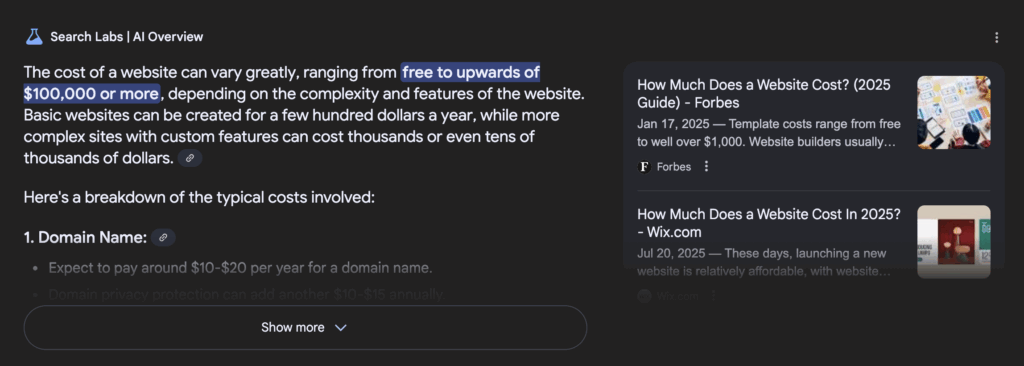If you’ve noticed your website getting fewer clicks lately, you’re not imagining things. Recent research reveals a dramatic shift in how people interact with search results, and it’s fundamentally changing the digital marketing landscape for small businesses.
The Numbers Don’t Lie
Multiple large-scale studies from 2025 paint a clear picture of what’s happening:
- When Google displays an AI Overview (those AI-generated summaries at the top of search results), users only click through to websites 8% of the time, compared to 15% when no AI summary appears
- The coveted #1 search ranking position has seen click-through rates drop from 28% to 19%, a staggering 32% decline
- Overall organic traffic has declined between 15% to 64% depending on the industry
- Certain sectors like news, how-to guides, recipes, and educational content have experienced up to 79% drops in page-level traffic
- An estimated 60% of searches are now “zero-click,” meaning users get their answers without visiting any website, and this figure is projected to reach 70% by mid-2025, so it’s happening now!
Why This Is Happening
The culprit? AI Overviews have fundamentally changed user behavior. When someone searches for information and sees a comprehensive AI-generated answer at the top of the results, they rarely feel the need to click through to the original sources. In fact, only about 1% of users who see an AI Overview actually click on the cited sources within it.
This trend is particularly devastating for businesses that depend on informational content to attract potential customers. Blog posts, how-to guides, and educational resources that once drove significant traffic are now being summarized by AI, eliminating the need for users to visit the original websites.

The Hidden Opportunity for Local Businesses
But here’s where it gets interesting for small businesses: this challenge presents a unique opportunity for those who understand how to adapt.
AI systems are still building their knowledge bases, and they rely heavily on information they can find online. Local businesses have a distinct advantage because you can publish location-specific, service-specific information that AI systems desperately need to create accurate local responses.
When someone in your area searches for services like yours, AI Overviews often have limited local data to work with. This means your business can become the primary source that feeds these AI responses, positioning you as the local authority in your field.
What This Means for Your Business Strategy
The fundamental shift means you need to think differently about your digital marketing approach:
1. Quality Over Quantity Traffic
The visitors you do receive will be more qualified than ever before. People are getting their preliminary questions answered by AI, so when they do click through to your website, they’re further along in their decision-making process. This makes it crucial that your website immediately validates their expectations and provides a clear path to action.
2. Your Website Must Perform Flawlessly
With fewer but more qualified visitors, every click counts. Your website needs to:
- Load quickly and work perfectly on mobile devices
- Immediately communicate what you do and who you serve
- Provide clear, compelling calls-to-action
- Capture contact information for longer sales cycles
3. Email Marketing Becomes Critical
Since traffic is declining but quality is increasing, capturing email addresses is more important than ever. You need automated email sequences that nurture these qualified leads, build trust, and demonstrate your expertise over time. (Learn more about this in our “5 Email Marketing Automations That Drive Business Growth” article.)
4. Local Authority Is Key
Your goal should be positioning your business as the go-to source for local information in your industry. This means creating content that answers specific questions people in your area are asking, optimizing your Google Business Profile, and ensuring your expertise is easily discoverable by AI systems.
Actionable Steps to Adapt Your Strategy
Optimize Your Google Business Profile
Your Google Business Profile is becoming more critical than ever. Ensure it’s 100% complete with:
- Detailed service descriptions using language your customers actually use
- Current business hours, including holiday hours
- Regular posts that demonstrate your expertise
- High-quality photos of your work, team, and location
- Prompt responses to customer questions and reviews
Create AI-Friendly Content
Focus on creating content that AI systems can easily understand and reference:
- Develop comprehensive FAQ sections written in conversational language
- Create location-specific service pages that answer common local questions
- Write detailed service descriptions that explain not just what you do, but why and how
- Include specific details about your service area, processes, and expertise
Strengthen Your Local SEO Foundation
With AI Overviews pulling from local sources, your local SEO strategy becomes even more important. This includes building local citations, earning genuine customer reviews, and creating content that establishes your authority in your geographic area. (For a complete breakdown of this process, see our detailed “How To Build A Willing Local Business SEO Strategy” article.)
Build Integrated Marketing Systems
Rather than relying on disconnected tools and platforms, focus on building integrated marketing systems that work together seamlessly. This includes connecting your website, email marketing, customer relationship management, and local listings into one cohesive system that nurtures leads and drives conversions.
The Businesses That Will Thrive
The companies that succeed in this new landscape will be those that understand they’re no longer just optimizing for search engines; they’re optimizing to become trusted sources that AI systems reference when answering local questions.
This requires a strategic approach that combines technical optimization, content creation, local authority building, and lead nurturing. It’s not about gaming the system; it’s about genuinely becoming the most helpful, authoritative source of information in your local market.
Looking Forward
While these changes represent challenges, they also create opportunities for businesses willing to adapt. The traffic you receive will be more valuable, the leads more qualified, and the potential for conversion higher than ever before.
The key is understanding that the rules have changed and adjusting your strategy accordingly. Businesses that cling to old approaches will struggle, while those that embrace these changes and position themselves as local authorities will thrive.
Take Action Today
Start by auditing your current digital presence:
- Is your Google Business Profile completely optimized?
- Does your website immediately communicate your value to qualified visitors?
- Do you have systems in place to capture and nurture leads?
- Are you positioned as the local authority in your field?
The businesses that take action now will have a significant advantage as these trends continue to evolve.
Ready to adapt your marketing strategy for the AI-driven search landscape? Schedule a free 15-minute Growth Strategy Session to discuss how to position your business as the local authority that both AI systems and customers turn to for answers.




